带有否定词的比较句
- 格式:docx
- 大小:15.88 KB
- 文档页数:2
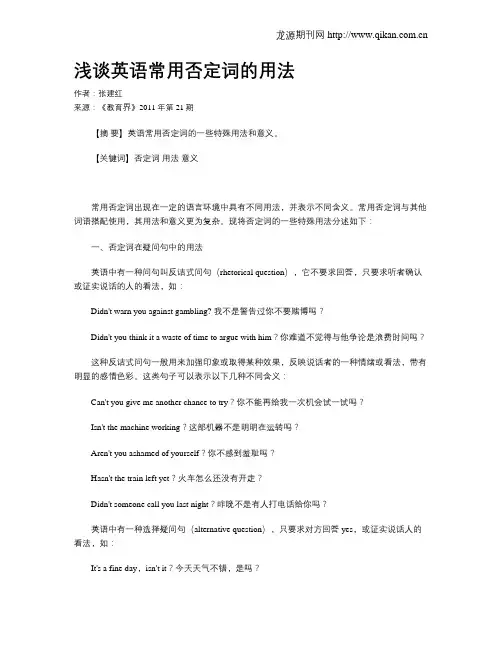
浅谈英语常用否定词的用法作者:张建红来源:《教育界》2011年第21期【摘要】英语常用否定词的一些特殊用法和意义。
【关键词】否定词用法意义常用否定词出现在一定的语言环境中具有不同用法,并表示不同含义。
常用否定词与其他词语搭配使用,其用法和意义更为复杂。
现将否定词的一些特殊用法分述如下:一、否定词在疑问句中的用法英语中有一种问句叫反诘式问句(rhetorical question),它不要求回答,只要求听者确认或证实说话的人的看法,如:Didn't warn you against gambling? 我不是警告过你不要赌博吗?Didn't you think it a waste of time to argue with him?你难道不觉得与他争论是浪费时间吗?这种反诘式问句一般用来加强印象或取得某种效果,反映说话者的一种情绪或看法,带有明显的感情色彩。
这类句子可以表示以下几种不同含义:Can't you give me another chance to try?你不能再给我一次机会试一试吗?Isn't the machine working?这部机器不是明明在运转吗?Aren't you ashamed of yourself?你不感到羞耻吗?Hasn't the train left yet?火车怎么还没有开走?Didn't someone call you last night?昨晚不是有人打电话给你吗?英语中有一种选择疑问句(alternative question),只要求对方回答yes,或证实说话人的看法,如:It's a fine day,isn't it?今天天气不错,是吗?You picked up the watch from the table ,did you not?这只表你是从桌子上拿起来的,是吗?这里not应重读,整句的意思是表示一种责问,did you not相当于did you dare to deny that?During all these years you have been lying to me,have you not?这些年来,你一直在对我撒谎,是吗?这里not应重读,整句表示说话人在向对方提出挑战,看他敢不敢否认这事实。
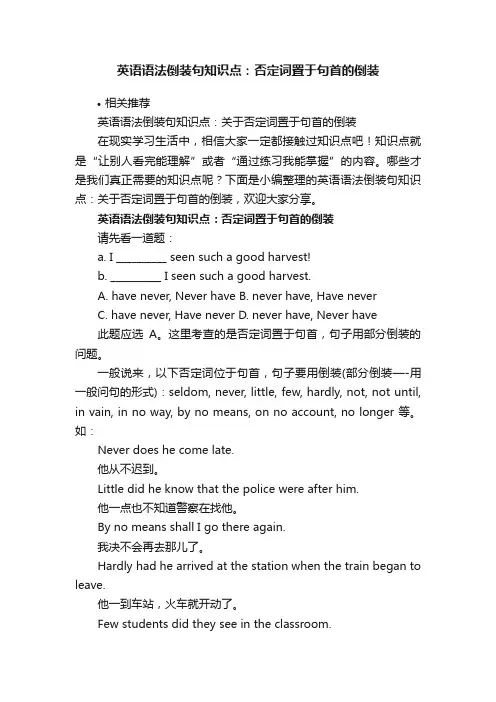
英语语法倒装句知识点:否定词置于句首的倒装•相关推荐英语语法倒装句知识点:关于否定词置于句首的倒装在现实学习生活中,相信大家一定都接触过知识点吧!知识点就是“让别人看完能理解”或者“通过练习我能掌握”的内容。
哪些才是我们真正需要的知识点呢?下面是小编整理的英语语法倒装句知识点:关于否定词置于句首的倒装,欢迎大家分享。
英语语法倒装句知识点:否定词置于句首的倒装请先看一道题:a. I __________ seen such a good harvest!b. __________ I seen such a good harvest.A. have never, Never haveB. never have, Have neverC. have never, Have neverD. never have, Never have此题应选A。
这里考查的是否定词置于句首,句子用部分倒装的问题。
一般说来,以下否定词位于句首,句子要用倒装(部分倒装—-用一般问句的形式):seldom, never, little, few, hardly, not, not until, in vain, in no way, by no means, on no account, no longer 等。
如:Never does he come late.他从不迟到。
Little did he know that the police were after him.他一点也不知道警察在找他。
By no means shall I go there again.我决不会再去那儿了。
Hardly had he arrived at the station when the train began to leave.他一到车站,火车就开动了。
Few students did they see in the classroom.他们在教室没看到几个学生。
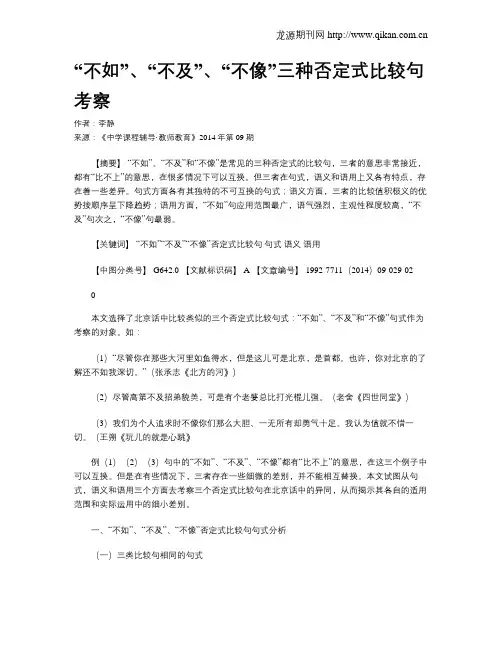
“不如”、“不及”、“不像”三种否定式比较句考察作者:李静来源:《中学课程辅导·教师教育》2014年第09期【摘要】“不如”、“不及”和“不像”是常见的三种否定式的比较句,三者的意思非常接近,都有“比不上”的意思,在很多情况下可以互换。
但三者在句式,语义和语用上又各有特点,存在着一些差异。
句式方面各有其独特的不可互换的句式;语义方面,三者的比较值积极义的优势按顺序呈下降趋势;语用方面,“不如”句应用范围最广,语气强烈,主观性程度较高,“不及”句次之,“不像”句最弱。
【关键词】“不如”“不及”“不像”否定式比较句句式语义语用【中图分类号】 G642.0 【文献标识码】 A 【文章编号】 1992-7711(2014)09-029-02本文选择了北京话中比较类似的三个否定式比较句式:“不如”、“不及”和“不像”句式作为考察的对象。
如:(1)“尽管你在那些大河里如鱼得水,但是这儿可是北京,是首都。
也许,你对北京的了解还不如我深切。
”(张承志《北方的河》)(2)尽管高第不及招弟貌美,可是有个老婆总比打光棍儿强。
(老舍《四世同堂》)(3)我们为个人追求时不像你们那么大胆、一无所有却勇气十足、我认为值就不惜一切。
(王朔《玩儿的就是心跳》例(1)(2)(3)句中的“不如”、“不及”、“不像”都有“比不上”的意思,在这三个例子中可以互换。
但是在有些情况下,三者存在一些细微的差别,并不能相互替换。
本文试图从句式,语义和语用三个方面去考察三个否定式比较句在北京话中的异同,从而揭示其各自的适用范围和实际运用中的细小差别。
一、“不如”、“不及”、“不像”否定式比较句句式分析(一)三类比较句相同的句式用X表示比较主体,Y表示比较客体,D为比较点,W为比较值,“不如”、“不及”和“不像”都是比较词。
三种比较句的典型句式为:“X的D不如/不及/不像Y的DW”。
(4)洋狗是最可怕的人,他们平常就以为中国姓不如外国姓热闹悦耳。
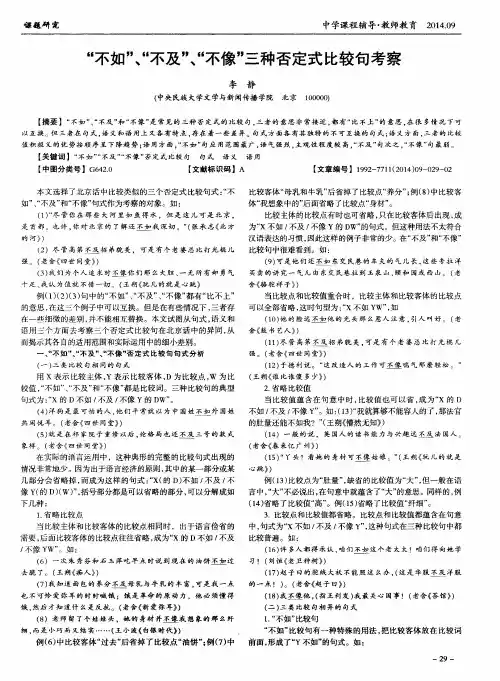
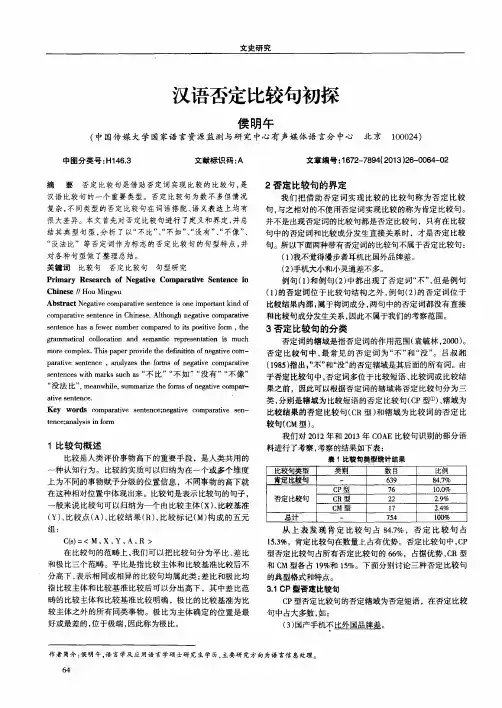
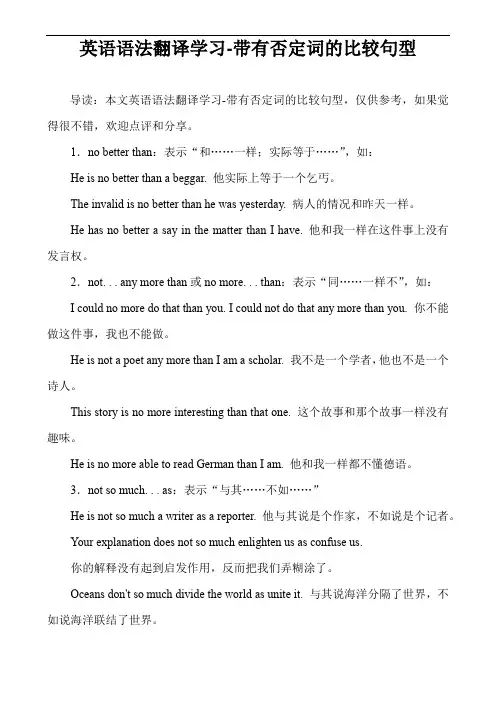
英语语法翻译学习-带有否定词的比较句型导读:本文英语语法翻译学习-带有否定词的比较句型,仅供参考,如果觉得很不错,欢迎点评和分享。
1.no better than:表示“和……一样;实际等于……”,如:He is no better than a beggar. 他实际上等于一个乞丐。
The invalid is no better than he was yesterday. 病人的情况和昨天一样。
He has no better a say in the matter than I have. 他和我一样在这件事上没有发言权。
2.not. . . any more than或no more. . . than:表示“同……一样不”,如:I could no more do that than you. I could not do that any more than you. 你不能做这件事,我也不能做。
He is not a poet any more than I am a scholar. 我不是一个学者,他也不是一个诗人。
This story is no more interesting than that one. 这个故事和那个故事一样没有趣味。
He is no more able to read German than I am. 他和我一样都不懂德语。
3.not so much. . . as:表示“与其……不如……”He is not so much a writer as a reporter. 他与其说是个作家,不如说是个记者。
Your explanation does not so much enlighten us as confuse us.你的解释没有起到启发作用,反而把我们弄糊涂了。
Oceans don't so much divide the world as unite it. 与其说海洋分隔了世界,不如说海洋联结了世界。
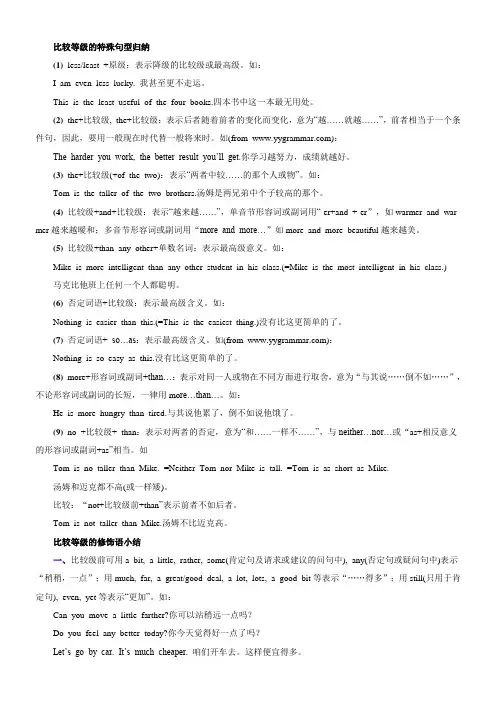
比较等级的特殊句型归纳(1) less/least +原级:表示降级的比较级或最高级。
如:I am even less lucky. 我甚至更不走运。
This is the least useful of the four books.四本书中这一本最无用处。
(2) the+比较级, the+比较级:表示后者随着前者的变化而变化,意为―越……就越……‖,前者相当于一个条件句,因此,要用一般现在时代替一般将来时。
如(from ):The harder you work, the better result you’ll get.你学习越努力,成绩就越好。
(3) the+比较级(+of the two):表示―两者中较……的那个人或物‖。
如:Tom is the taller of the two brothers.汤姆是两兄弟中个子较高的那个。
(4) 比较级+and+比较级:表示―越来越……‖,单音节形容词或副词用―-er+and +-er”,如warmer and war mer越来越暧和;多音节形容词或副词用“more and more…”如more and more beautiful越来越美。
(5) 比较级+than any other+单数名词:表示最高级意义。
如:Mike is more intelligent than any other student in his class.(=Mike is the most intelligent in his class.) 马克比他班上任何一个人都聪明。
(6) 否定词语+比较级:表示最高级含义。
如:Nothing is easier than this.(=This is the easiest thing.)没有比这更简单的了。
(7) 否定词语+ so…as:表示最高级含义。
如(from ):Nothing is so easy as this.没有比这更简单的了。


由于英语和汉语的语法习惯差异,含有否定意义词的相关句型在翻译和具体含义理解上是一大难点。
下面小编就翻译时比较常见的关于否定句的误区来详细解释一下~(一)部分否定和全部否定1,部分否定,当not出现在含有表示全部肯定的不定代词(all,every-,both等)时,不管是之前还是之后,即表示整体中的一部分被否定。
译为“并非一切⋯⋯都”或“并非都是”(1)三者或三者以上的部分否定,当not出现在含有表示全部肯定的不定代词——al1,every,everyone,everybody,everything的句子中如:Not all birds can fly./All birds can’t fly.不是所有的鸟儿都能飞。
Not everyone thinks that the government is being particularly generous.并非所有人都认为政府特别慷慨。
All his haste was of no use.他白忙了。
总括性副词everywhere,wholly完全地,全部,统统,always,altogether etc.这些词和not连用时也表示部分否定。
Acid rain is not straightforwardly attributable to the burning of coal.酸雨并非简单地由烧煤造成。
(2)两者的部分否定——由not 和both组成Not both the artists have a keen eye for beauty. =both of the artists don’’t have a keen eye for beauty.这两位艺术家并非都有审美的眼光.(一定要记住是“并非都”,很容易出错的!)2,全部否定(1)英语中表示三者以上的“全不”时,常用否定词语no one,none,nothing,nobody,never,nowhere,not⋯any 以及no+名词等,表示全部否定。
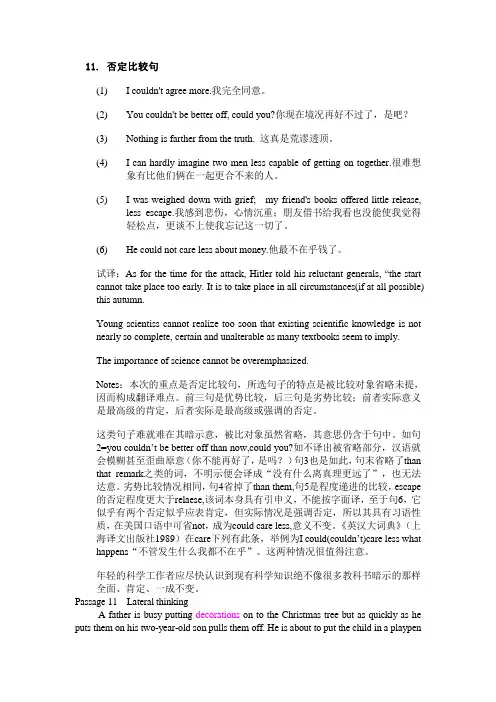
11.否定比较句(1)I couldn't agree more.我完全同意。
(2)You couldn't be better off, could you?你现在境况再好不过了,是吧?(3)Nothing is farther from the truth. 这真是荒谬透顶。
(4)I can hardly imagine two men less capable of getting on together.很难想象有比他们俩在一起更合不来的人。
(5)I was weighed down with grief; my friend's books offered little release,less escape.我感到悲伤,心情沉重;朋友借书给我看也没能使我觉得轻松点,更谈不上使我忘记这一切了。
(6)He could not care less about money.他最不在乎钱了。
试译:As for the time for the attack, Hitler told his reluctant generals, “the start cannot take place too early. It is to take place in all circumstances(if at all possible) this autumn.Young scientiss cannot realize too soon that existing scientific knowledge is not nearly so complete, certain and unalterable as many textbooks seem to imply.The importance of science cannot be overemphasized.Notes:本次的重点是否定比较句,所选句子的特点是被比较对象省略未提,因而构成翻译难点。
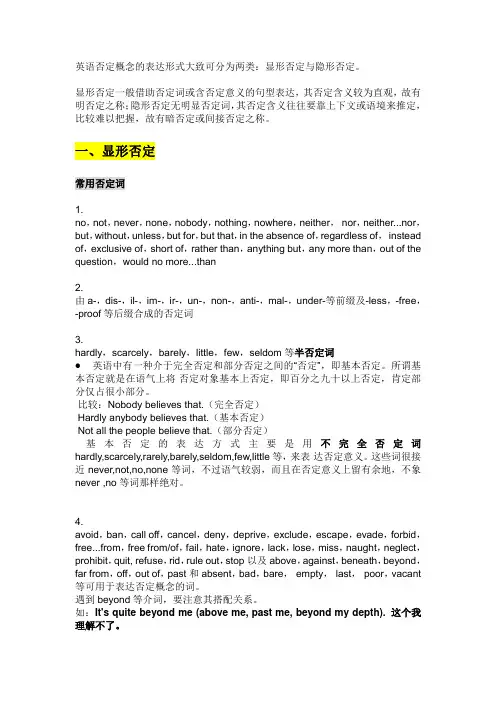
英语否定概念的表达形式大致可分为两类:显形否定与隐形否定。
显形否定一般借助否定词或含否定意义的句型表达,其否定含义较为直观,故有明否定之称;隐形否定无明显否定词,其否定含义往往要靠上下文或语境来推定,比较难以把握,故有暗否定或间接否定之称。
一、显形否定常用否定词1.no,not,never,none,nobody,nothing,nowhere,neither,nor,neither...nor,but,without,unless,but for,but that,in the absence of,regardless of,instead of,exclusive of,short of,rather than,anything but,any more than,out of the question,would no more...than2.由a-,dis-,il-,im-,ir-,un-,non-,anti-,mal-,under-等前缀及-less,-free,-proof等后缀合成的否定词3.hardly,scarcely,barely,little,few,seldom等半否定词英语中有一种介于完全否定和部分否定之间的“否定”,即基本否定。
所谓基本否定就是在语气上将否定对象基本上否定,即百分之九十以上否定,肯定部分仅占很小部分。
比较:Nobody believes that.(完全否定)Hardly anybody believes that.(基本否定)Not all the people believe that.(部分否定)基本否定的表达方式主要是用不完全否定词hardly,scarcely,rarely,barely,seldom,few,little等,来表达否定意义。
这些词很接近never,not,no,none等词,不过语气较弱,而且在否定意义上留有余地,不象never ,no等词那样绝对。
专题3形容词和副词形容词和副词在高考试题中始终占很重要的地位。
近几年高考对形容词和副词的考查具有“淡化语法、注重深层语义”的特点,以形容词和副词辨析为热点。
同时继续加强对形容词和副词比较等级的考查。
其考点主要包括:1.考查形容词和副词词义辨析。
2.考查形容词修饰名词时的词序,即指示代词/不定代词+数词(序数词、基数词)+描绘性形容词+特征性形容词(大小、长短、高低、形状、年龄、新旧)+颜色形容词+国籍、出处+物质、材料+用途、类别+中心名词。
3.考查形容词和副词比较等级的常用句型及其修饰成分在句中的位置。
4.考查与形容词和副词有关的习语结构。
知识点一、形容词和副词的基本用法1.形容词在句中的作用。
(1)形容词在句中可作定语、表语和补语。
(2)形容词在句中也可作状语,用来表示主语所处的状态。
He was lying in bed,dead.(3)alone/afraid/asleep/awake/alive/ashamed/ill/well(身体好)等常用作表语而不用作定语。
如:He is an ill man.(错)The man is ill.(对)She is an afraid girl.(错)The girl is afraid.(对)(4)twoyearold/200metrelong/onethousandword等复合形容词中的名词要用单数,一般只用作前置定语。
如:Tom is a twoyearold boy.2.副词在句中的作用。
副词在句中一般用作状语,修饰动词、形容词或其他副词,也可修饰整个句子。
如:Obviously you are wrong.知识点二、常用连接性副词的用法1.though用作副词时,常在句末,意为“然而,可是”,表示转折意义。
2.therefore“因此,所以”,表示结果。
多用于否定的双音节词语和成语1.置疑【释义】“怀疑”之义,多用于否定,常与“不容”“无可”“毋庸”等表否定义的词语连用。
2.捉摸【释义】指猜测、预料,多用于否定,常用于“难以”“无法”之后或“不定”“不透”等否定词之前。
3.释怀【释义】指(爱憎、悲喜等感情)在心中消除,多用于否定,常置于“不能”“难以”等否定词之后。
4.企及【释义】指盼望达到,希望赶上,多用于否定,常与“难以”“不可”等词语连用。
5.小觑【释义】“小看、轻视”之义,多用于否定,常用于“不可”“不能”之后或“不得”之前。
6.比拟【释义】其作“比较”之义解时,常与“无可”“难以”等表否定义的词语连用。
7.赘言【释义】犹言“赘述”,乃“说不必要的话”之义,多用于否定,常与“不再”“毋庸”等词语连用。
8.置喙【释义】“插嘴”之义,多用于否定,常与“不容”“不敢妄自”等词语连用。
9.置信【释义】“相信”之义,常与“不可”“难以”等表否定义的词语连用。
10.名状【释义】指说出事物的状态,多用在否定词“难以”“不可”“莫可”等的后面。
看句子:“她平时特别喜欢孩子,在与孩子分别的日子里,她无时无刻都在想着孩子。
”这里的“无时无刻”用得也不够合适,“无时无刻不”才表示“永远不间断”的意思,可见,这个成语也是常常用于否定式的。
像这样的成语有11、“同日而语”,意思是“放在同一时间谈起,形容能相比,可以相提并论”,习惯上说“不可同日而语”以表示差别大;12、“相提并论”,意思是“把不同的人或不同的事物混在一起来谈论或看待”,习惯上说“不能相提并论”以表示有差别;13、“吹灰之力”,意思是“比喻很小的力量”,习惯上说“不费吹灰之力”表示特别容易;14、“等量齐观”,意思是“不管事物间的差异,同等看待”,习惯上说“不可等量齐观”表示要区别对待;15、“混为一谈”,意思是“把不同的事物混在一起,说成是同样的事物”,习惯上说“不能混为一谈”表示要有所区别;16、“鹿死谁手”,意思是“以追逐野鹿比喻争夺天下、进行比赛”,习惯上说“不知鹿死谁手”表示难以预测谁能获胜;17、“天高地厚”,主要是表示“事物的复杂性”,习惯上说“不知天高地厚”表示狂妄自大;18、“一蹴而就”,意思是“踏一步就成功,形容事情轻而易举,一下子就能完成”,习惯上说“不能一蹴而就”表示事情有一定的难度;例如:“学习要持之以恒,绝不是一蹴而就的事。
几个值得注意的比较级句式一、the+比较级, the+比较级此句型表示后者随着前者的变化而变化,意为“越……就越……”,前者相当于一个条件句,因此,要用一般现在时代替一般将来时。
如:The better I knew him, the more I liked him. 我越了解他就越喜欢他。
The more difficult the questions are, the less likely I’ll be able to answer them. 题目越难我越答不出。
二、the+比较级+of the two表示“两者中较…的那个人或物”时,在比较级前加定冠词the。
如:He is the taller of the two. 他是两人中较高的那个。
She was the more promising worker of the two. 她是两人之中更有培养前途的工人。
三、比较级+and+比较级此句型表示“越来越…”,单音节形容词或副词用“-er+and +-er”,如:Things are getting better and better every day. 情况一天天好起来。
It’s becoming more and more difficult to find a job. 找工作越来越困难了。
Holiday nights are getting less and less expensive. 假日机票越来越便宜了。
四、not +比较级+ than / no +比较级+ than比较级前加not,表示前者不如后者,与not as…as相当;比较级前加no是对两者的否定,意为“和……一样不……”,与neither…nor…或“as+相反意义的形容词或副词+as”相当。
如:He is not taller than me. 他不如我高。
He is no taller than me. 他同我一样不高。
英语语法:带有否定词的比较句型1.no better than:表示“和……一样;实际等于……”,如:He is no better than a beggar. 他实际上等于一个乞丐。
The invalid is no better than he was yesterday. 病人的情况和昨天一样。
He has no better a say in the matter than I have. 他和我一样在这件事上没有发言权。
2.not. . . any more than或no more. . . than:表示“同……一样不”,如:I could no more do that than you. I could not do that any more than you. 你不能做这件事,我也不能做。
He is not a poet any more than I am a scholar. 我不是一个学者,他也不是一个诗人。
This story is no more interesting than that one. 这个故事和那个故事一样没有趣味。
He is no more able to read German than I am. 他和我一样都不懂德语。
3.not so much. . . as:表示“与其……不如……”He is not so much a writer as a reporter. 他与其说是个作家,不如说是个记者。
Your explanation does not so much enlighten us as confuse us.你的解释没有起到启发作用,反而把我们弄糊涂了。
Oceans don't so much divide the world as unite it. 与其说海洋分隔了世界,不如说海洋联结了世界。
I don't so much dislike him as hate him. 我与其说不喜欢他,不如说我恨他。
疑问代词“哪里”的否定用法一、引言我们首先来看下面几个句子:(1)他哪里是湖南人,这么不能吃辣椒。
(2)我哪能比你高啊。
(3)你真厉害!——哪里,哪里!(4)她真漂亮!——哪里漂亮啊!“哪里”,作为一个比较典型的疑问代词,一般是用来表示特指疑问的,如询问处所等。
但在以上的句子中,我们可以明显地感觉到“哪里”表否定的用法,这是一种非疑问的用法。
如,在第一句中,“他哪里是湖南人,这么不能吃辣椒”,这是表示他不是,或者说不像湖南人,因为他不能吃辣椒;第二句,“我那能比你高啊”,这是表示我没有你高。
疑问代词的这种否定用法现在已经被很多人注意到了,较早提到疑问代词否定用法的是吕叔湘先生的《现代汉语八百词》,该书在分析相关疑问代词时,注意到了疑问代词的这一特殊用法,并举了很多此类例子,如:(5)同志,麻烦你了!——哪里!这是应该的。
(6)你跑什么,还有事跟你说呢!(7)脾气来了就砸车,这怎么行?从这些语言事实中我们得知大部分疑问代词都是可以表示否定含义的,下面本文就重点分析“哪里”的否定用法及其来源,并将它与有相同用法的“什么”做一个比较分析,从中讨论它们的异同。
二、“哪里”表否定的结构分析(一)“哪里”+动词或动词性词组“哪里”在表否定时后面可以直接接动词或动词性词组,表示对动词或动词性词组的一种否定,如:(8)a.他哪里是小王。
(9)a.我哪里找得到他。
(10)a.这里哪里能和家里比。
这三句话中的“哪里”都是对紧接着的动词的否定,分别表示的是:(8)b.他不是小王。
(9)b.我找不到他。
(10)b.这里不能和家里比。
但比较起直接用“不”来作否定词的形式,用“哪里”表否定传达出的含义要比它们多,带有较明显的感情色彩,往往有一种不满、不屑或不可能的情绪意义,否定色彩要比b类句式强一些。
所以a类句式后往往可以带语气词,句末也可以用感叹号:(8)c.他哪里是小王啊!(9)c.我哪里找得到他啊!(10)c.这里哪里能和家里比啊!(二)“哪里”+名词“哪里”后直接接名词,表示一种反诘,如:(11)哪里的工作好找啊!(12)哪里天空不下雨啊!(13)哪里的花朵永远鲜艳啊!这种直接加名词的形式,“哪里”与上面两种不同在于,前面两种句式中的“哪里”已经失去了本身所含有的空间性,只是用来表示否定。
1、no better than:表示“和……一样;实际等于……”,如:
He is no better than a beggar. 他实际上等于一个乞丐。
The invalid is no better than he was yesterday. 病人的情况和昨天一样。
He has no better a say in the matter than I have. 他和我一样在这件事上没有发言权。
2、not. . . any more than或no more. . . than:表示“同……一样不”,如:
I could no more do that than you. I could not do that any more than you. 你不能做这件事,我也不能做。
He is not a poet any more than I am a scholar. 我不是一个学者,他也不是一个诗人。
This story is no more interesting than that one. 这个故事和那个故事一样没有趣味。
He is no more able to read German than I am. 他和我一样都不懂德语。
3、not so much. . . as:表示“与其……不如……”
He is not so much a writer as a reporter. 他与其说是个作家,不如说是个记者。
Your explanation does not so much enlighten us as confuse us.
你的解释没有起到启发作用,反而把我们弄糊涂了。
Oceans don't so much divide the world as unite it. 与其说海洋分隔了世界,不如说海洋联结了世界。
I don't so much dislike him as hate him. 我与其说不喜欢他,不如说我恨他。
4、nothing like:表示“没有什么能比得上……”
There is nothing like home. 金窝银窝,不如自己的草窝。
There is nothing like walking as a means of keeping fit. 没有比散步来保持健康更好的了。
There is nothing like leather for shoes. 做鞋用皮革再好没有了。
5、nothing like(或near)as(或so)... as:表示“远远不像……那样”
This novel is nothing near so interesting as that one. 这篇小说远远不及那篇小说有趣。
The book is nothing like as difficult as I expected. 这本书远没有我想像的那么难懂。
His analysis of the poem is nothing like as penetrating as yours. 他对这首诗的分析远没有你的分析那样透彻。
6、no less … than:表示“和……一样”
He is no less active than he used to be. 他和从前一样活跃。
His mind is no less alert than yours. 他的思路和你的一样敏捷。
Our soldiers fought with no less daring than skill. 我们的士兵作战的英勇不亚于他们的战斗技能。